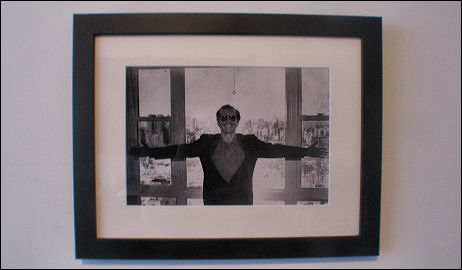Jon Favreau’s Iron Man, set for release by Paramount in May 2008, is an adaptation of Stan Lee‘s Marvel comic about “troubled” billionaire Tony Stark (Robert Downey) who’s forced to wear a “life-support suit” after a life-threatening accident, and thereafter turns this hindrance into a crime-fighting alter ego routine. (Sounds more or less like the same old Bruce Wayne shit, no?)
As some of you know, IESB posted video footage last Thursday of a guy (Downey?) in an Iron Man suit between takes in Long Beach. Yesterday Paramount attorney’s pressured IESB’s server to shut the shite down due ot perceived copyright infringement. Except it wasn’t quie that, and IESB editors Robert and Stephanie Sanchez hassled it out with Paramount and finally got the site up again this morning.
Here’s the IESB version of how it all went down:
“The IESB is back up and running. We want to thank everyone for their phone calls, emails and postings. We were just put back online around 8:00am after being shut down yesterday at 2:15pm Pacific.
“To answer everyone√ɬ¢√¢‚Äö¬¨√¢‚Äû¬¢s questions, yes, it is true [that] Paramount Pictures sent a letter to our hosting company demanding that our site be shut down immediately claiming copyright infringement from our spy video and images of the Iron Man set that are posted here.
“We were not notified in any way, or asked to take it down, we were literally in the middle of posting a story and all of a sudden our server was gone. We called our hosting company, they transferred us to legal and we were forwarded the letter that was sent from Paramount on Friday that demanded the site be shut down — a letter we were never sent and weren’t given any warning about.
“Here’s the kicker — the video and pictures that were in question, were IN NO WAY property of Paramount Pictures. Both were shot from a parking lot of a 24 Hour Fitness Center across the street from the Iron Man shoot that was taking place on a PUBLIC STREET in Long Beach CA. There was no violation of copyright whatsoever.
“After hours on the phone yesterday with Paramount reps (who had no clue about it) they completely apologized and said this should have never happened, it was the idiots in the Paramount legal department who did this without checking with anyone else. But, it was too late when they finally got a retraction together, the legal dept. at our hosting company was already closed and had gone home for the day and wouldn’t receive any of Paramount’s requests until the morning.
“So we just had to wait, and wait some more. We lost traffic, we lost respect for the studio, we lost out financially and most importantly it was just really a blow to our reputation.
“Without even asking, the online community posted and supported us through the entire ordeal. Everyone’s sentiments and support are very much appreciated.
“We need to say thanks to our online colleagues, LatinoReview, TheMovieBlog, Ropeofsilicon, Collider, FilmStalker, Ain√ɬ¢√¢‚Äö¬¨√¢‚Äû¬¢t It Cool News, Obsessedwithfilm, Firstshowing, Film.com, Cinema Blend, Cinematical and the many others who posted or sent in kind words of support. Thanks guys!
“Robert Sanchez and Stephanie Sanchez and the entire IESB team.”


